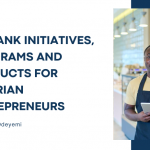Nigeria has opened the application portal for the Student Venture Capital Grant, a federal initiative designed to support student-led ventures with equity-free funding of up to N50 million.
The programme positions itself as a national engine for innovation by targeting students across all states and the FCT, especially those building solutions in science, technology, engineering, mathematics, and medical sciences.
The launch reflects a growing push to strengthen Nigeria’s innovation pipeline and prepare young entrepreneurs to build ventures that can scale into sustainable businesses. For student founders, the programme offers not just funding but structured validation, visibility, and long-term support designed to move ideas from concept to market.
Through the official portal, students submit details about their business, including a pitch video and funding request. Each application undergoes multiple review rounds, and even those not selected immediately remain in the Innovation Repository where they can attract future opportunities.
Successful applicants are guided through a validation phase that helps refine solutions, stress-test business models, and prepare for milestone-based financing. Funding is released in tranches as teams meet pre-defined targets, ensuring accountability and real progress throughout the incubation period. Early applicants will also gain access to a free one-year Google Gemini Pro and Advanced licence to strengthen product development and technical execution.
To participate, students begin by creating an account on the portal, entering basic information and verifying their identity through a one-time password sent to their email. They must then complete their academic profile by selecting their institution, department, and level while uploading a valid school document such as a student ID or admission letter.
After completing the account setup, they can proceed to submit their venture for consideration.
The grant is open to students enrolled in universities, polytechnics, and colleges of education across Nigeria, with both public and private institutions eligible.
Applicants must be at least in 300 level or its equivalent, though lower-level students may join teams led by those who meet the requirement. A registered company is not mandatory at the point of application, but every project must have a business name registered with the Corporate Affairs Commission.
Applications may be submitted individually or as a team, provided the venture falls within STEMM fields and has moved beyond the proof-of-concept stage.
For the wider ecosystem, including small businesses and early-stage founders, the program represents a pipeline for future MSMEs built on innovation rather than necessity.
By supporting students with equity-free capital, structured guidance, and exposure to advanced digital tools, the initiative strengthens Nigeria’s capacity to nurture high-growth enterprises that can eventually contribute to job creation and economic diversification.










